I spent a week on Mastodon, the social media platform some are turning to as they abandon Elon Musk's Twitter. This is what it was like.
Pete Syme

- I tried Mastodon, the app that many disillusioned Twitter users are flocking to, for a week.
- Its confusing servers and emphasis on decentralization only attracts the most tech-savvy.
Elon Musk said that Twitter usage "is at an all-time high" following his controversial takeover of the social media platform. Average daily downloads have surged too, according to research firm Apptopia, but its director of content, Adam Blacker, told Insider's Kali Hays: "It's like a car accident on the highway. People like to stop and watch."
Some come and watch, others are fleeing the scene. Looking for a similar platform with less dramatic ownership, almost 500,000 new users joined Mastodon in the ten days following Musk's $44 billion acquisition of Twitter.
I downloaded the app a week ago, exploring its servers and accounts, making friends and foes. From its glitches to its progressive mindset, this is what my experience has been like.
Servers are confusing, because Mastodon isn't really one website.
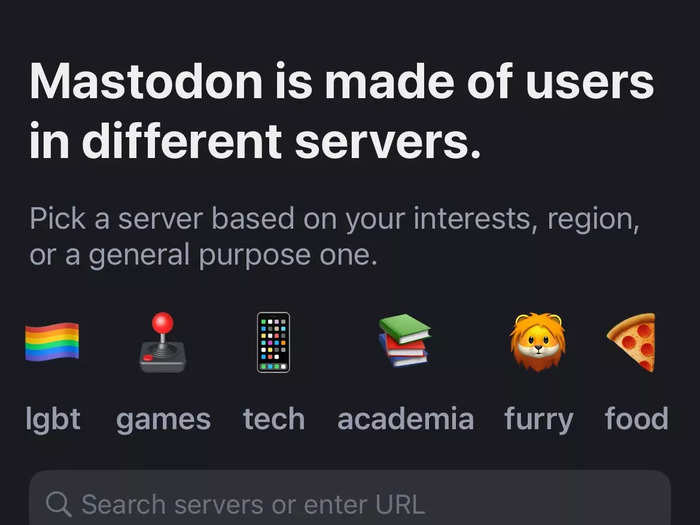
The most daunting part of Mastodon comes as soon as you press "Sign Up." Because it's decentralized, the app isn't really one site like Twitter, but a collection of servers, like multiple kids stacked under a Mastodon trench coat.
The flurry of URLs is off-putting, with categories ranging from journalism to furries and everything in between. It's worth seeing which server your friends or other Twitter migrants are on to find what might work best for you.
Most of the big accounts are on general servers like "mastodon.social," but when I tried to join it, it wasn't letting anybody else in. The pop-up message felt like a testy nightclub doorman shooing away latecomers.
You can switch servers later, but it's a real hassle because you have to create a whole new account then log back into the old one to migrate your profile over.
You can still see what people are saying on other servers, but it is a bit glitchy and limits your interactions. Server owners also get to decide which other servers you can interact with, so it could be out of your control.
I eventually settled for "mas.to," another general server with about 100,000 users.
Getting started with the Community tab
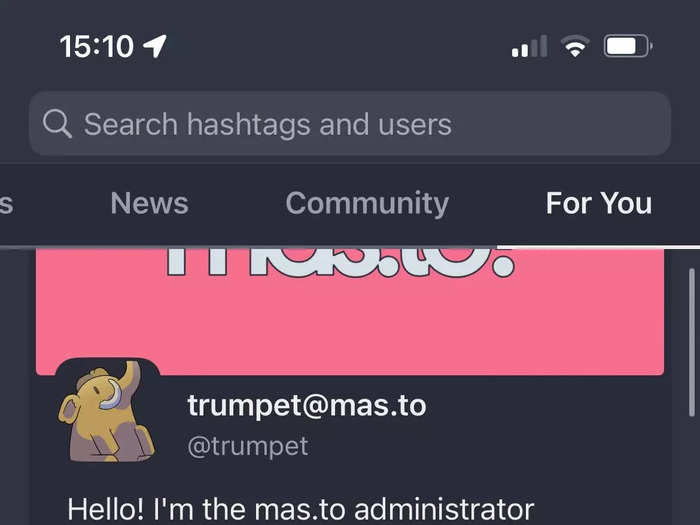
Mastodon handily gives you a list of suggested follows, and I mostly added a few tech journalists to try and recreate my Twitter feed. The app's recent popularity means that it's mostly just people who are following tech news that are using it, meaning there isn't much variation – more on this later.
The app's best feature is a "Community" tab, which shows you recent messages from your server. It makes it easier to find new people and explore what Mastodon is about, in a way which other social media lacks.
It would be even better if it was somewhat tailored to you, like TikTok's "For You" page, but nonetheless it makes for a smoother introduction than Twitter or Facebook. Confusingly, Mastodon does have a "For You" tab, but it seemed to just be a list of big accounts it suggested I follow.
Everybody's introducing themselves, and using far too many hashtags
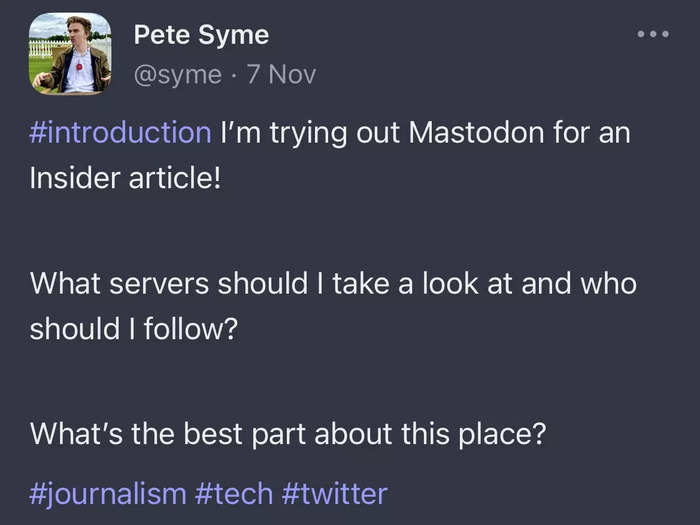
Introductions were the most frequent post in the Community tab. The email you get upon signing up encourages you to use the #introductions hashtag, and because Mastodon has had such a rapid influx of users, there are lots of them.
Largely, they're wholesome: People telling you where they're from, their niche hobbies, their political compass – like Tinder, but for social media followers.
The main problem is that people overdo it with the hashtags, which makes Mastodon ugly. There are @s and #s everywhere with all the server names and introductions, which makes it invariably tech-focused. People were adding a hashtag to almost every other word to try and attract more followers, but it feels spammy and hard to look at.
Hashtags began to phase out of use on Twitter as people just searched for phrases rather than the tags themselves. And even worse, they don't seem to work properly on Mastodon.
I kept trying to search the introduction hashtag and my screen just stayed black. I swiped down to refresh the page, and still nothing popped up. I tried again with the popular hashtags – still nothing.
It feels old. More features need to be added to compete with mainstream social media

Mastodon also lacks a translation feature. Because I joined such a large server there were posts in several languages from German to Arabic, which were unreadable because it's not worth copying every post into another app – it's another thing that you'd expect will be introduced as the platform grows.
Cute cat videos, however, transcend the barriers of language.
You find accounts like The Guardian also, but they're actually unofficial – run by people who just like its content. Mastodon posts also don't have any sort of link preview feature like every other social media nowadays, which makes it less enticing to actually engage with any news.
The most interesting articles have their own News tab, with a proper headline and image; essentially a watered-down Twitter Moments. But with 978 people talking about the top one, clicking on it takes you straight to the article, with no clear way to see the online conversation about it.
Mastodon could become a Democrat's version of Truth Social
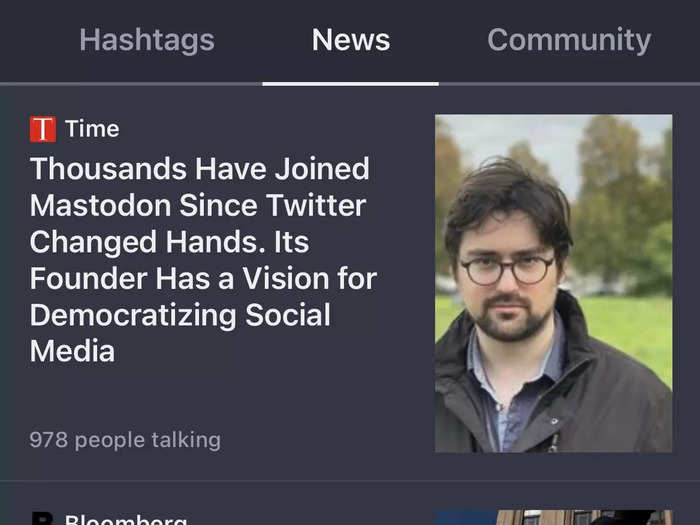
The News tab reveals another flaw about Mastodon – everyone is mostly just talking about Twitter.
The top article was an interview with Mastodon's founder, Eugen Rochko, about why everyone was leaving Twitter; second was a Bloomberg piece about Twitter layoffs; and third was just a link to a tweet.
This will likely change as the news moves on, of course, but if you're moving to Mastodon to escape Twitter, it's still very much the main conversation.
Many users just reposted tweets directly from Twitter as well. I even saw one guy using Mastodon to ask somebody to unblock him on Twitter.
Aside from this, though, many spoke about how welcoming their new community had been. If people weren't complaining about Musk, they were complaining about right-wing politics, and finding comfort among like-minded users.
In some ways, it seems like Mastodon could become a Democrat's equivalent of Truth Social.
The highest trending hashtag was #BikeTooter, where users shared their love for cycling as opposed to cars. I also saw several users declaring their profile a safe space for reproductive justice, worried about the consequences of Roe v Wade being overturned.
There were calls for trans rights and a general strike too, while many Brits used the #FBPE hashtag to identify themselves as anti-Brexit.
Findom, furries, and fakes – do not "Tap to reveal"

Rules vary between servers – most of them are strict about NSFW content, others basically specialize in it.
In the former category, posts use Mastodon's warning tool to censor content. But the problem is, sometimes people just use it to build suspense, with no actual warning of what's underneath, so you can't really know what's a joke and what's pornography.
If something just says "Tap to reveal," I'd recommend not tapping. I mistakenly revealed one post from a user who actually should've stayed on the furry servers. Never again.
In slightly tamer variations on the pornographic, it was somewhat reassuring to see that the financial domination cohort of tweeters have also moved to Mastodon. To see a couple posts from women demanding money from their paypigs actually grounded the app in a wider community beyond tech nerds and politics.
I also stumbled across some accounts claiming to be Harry Styles and Taylor Swift – usually I'd shrug it off as parody, but they had a blue-tick symbol. The two users spoke in Spanish to each other, especially odd given a rather tense breakup in 2013. It turns out verification on Mastodon isn't actually a thing, it's just a blue-tick emoji specific to the server they're on. Still, it could make for a very confusing experience.
It feels easy to make new friends, so Mastodon can feel more like Discord than Twitter.
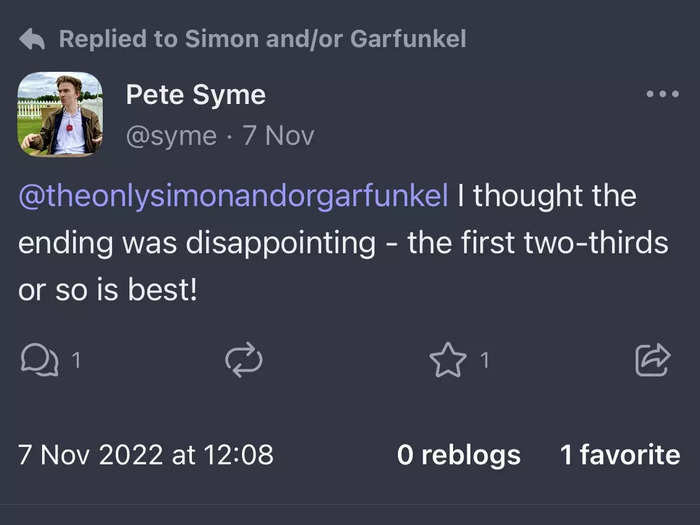
Only one of my friends signed up for Mastodon and that was because I asked around while working on this piece. He'd previously given up after being dispirited by the server page. The only person I knew of on the app before that was my old journalism professor who literally taught the class on social media.
I do feel a bit bad for laying into all Mastodon's faults, because there were some good moments too. While scrolling through the Community tab, the cover of Otessa Moshfegh's novel "A Year of Rest and Relaxation" popped up.
I'd enjoyed reading it over the summer, and this user was lamenting how they had to return it to the library before finishing it. I tried to console him: the ending was the worst bit, in my opinion. We exchanged pleasantries about reading novels, and complained about some of Mastodon's glitches together.
In this way, Mastodon reminded me more of Discord than Twitter. Both are made up of servers tailored to different interests, a bit nerdier than mainstream social media, and lend themselves to a more easygoing, friendlier atmosphere. That idea of meeting new people and being part of a community is less common on Twitter unless you're a K-pop stan, so Mastodon gets the win on this.
Mastodon was designed for a specific audience. I don't think it works for me.
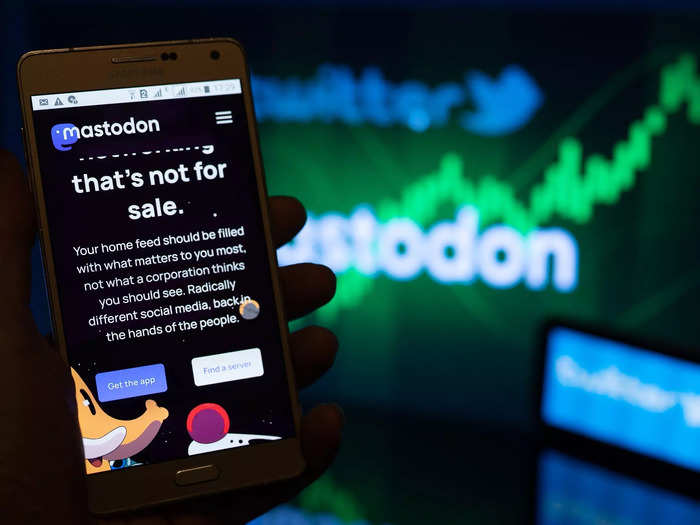
Mastodon is too technical. You can write off a lot of the glitches for now because it's dealing with a lot of new users, but with its servers and its abundant hashtags, it's just not cool.
Most of its acolytes are tech writers and hackers, because that's who it's made for – its 2016 launch was first announced on Hacker News. Its emphasis on "decentralization" and "open-source" are words which only amaze and inspire the most tech-savvy. To everyone else, it's just jargon.
Sure, it seems pretty easy to become part of a new community on Mastodon, but one of the key parts of social media is that your real-life friends are sharing online too. I want to see my friends' posts, the latest memes – like that guy on Twitter who ate an entire rotisserie chicken 40 days in a row – and scoops are always tweeted before they hit the newsstands.
Social media depends on its users, and while I expect more people will want to leave Musk's platform in the future, Mastodon only has 1.6 million compared to Twitter's 450 million. With 281 tweeters for every Tooter, that's almost like comparing the population of Barbados to Germany.
I found myself spending just as much time on Twitter as before, and my scrolls through Mastodon soon reduced. I really did want it to be exciting and enjoyable, but I just got bored.
Popular Right Now
Popular Keywords
- India’s wearables market decline
- Vivo V40 Pro vs OnePlus 12R
- Nothing Phone (2a) Plus vs OnePlus Nord 4
- Upcoming smartphones launching in August
- Nothing Phone (2a) review
- Current Location in Google
- Hide Whatsapp Messages
- Phone is hacked or not
- Whatsapp Deleted Messages
- Download photos from Whatsapp
- Instagram Messages
- How to lock facebook profile
- Android 14
- Unfollowed on Instagram
Advertisement